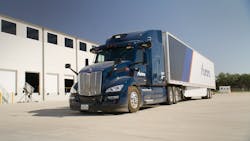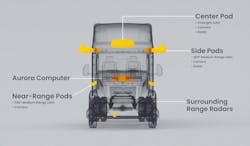Commercial-Ready Route in Texas for Driverless Trucks Planned for Late 2024
Today’s freight industry is strained by a combination of network inefficiency, labor shortages, collisions, hours of service limitations, and driver turnover. Commercial trucking companies such as Aurora Innovation believe self-driving technology can address these challenges.
The question is where to start. Aurora thinks one answer is the I-45 corridor between Dallas and Houston, which is one of the busiest commercial routes in the southwest with nearly half of all truck freight in Texas moving along it. The company is preparing the industry’s first “lane” for driverless trucks supported by commercial-ready terminals in Dallas and Houston. The autonomous lane on I-45 will not be a separate lane—it’s on the actual highway.
According to Aurora, it has 75 trucks already on the road with self-driving technology, but with a safety operator. It wants to increase this to 100 by the end of the year. The trucks are designed to operate between warehouses in the two cities. They are SAE Level 4 vehicles, able to travel independently along a completely mapped and predictable route.
The terminal in Houston, similar to Aurora’s first such terminal in South Dallas, is designed to support and service driverless trucks at a commercial scale. Both operate day and night. The terminals will be supported by a team of dispatchers who will allocate trucks and trailers, as well as a remote Command Center manned by specialists to monitor the fleet on the road.
Maximizing Road Time
Aurora’s terminal blueprint is designed to maximize the time autonomous trucks are on the road hauling freight. For example, on-site weigh stations support enhanced pre-trip inspections, which ensures that Aurora’s trucks are compliant with regulatory standards while allowing them to bypass inspection sites on the road.
“Opening a driverless trucking lane flanked by commercially ready terminals is an industry-first that unlocks our ability to launch our driverless trucking product,” said Sterling Anderson, Co-Founder and Chief Product Officer at Aurora. “With this corridor’s launch, we’ve defined, refined, and validated the framework for the expansion of our network with the largest partner ecosystem in the autonomous trucking industry.”
Anderson added, “Bringing our commercial-ready terminals and services online a year ahead of our planned commercial driverless launch between Dallas and Houston enables us to focus next year on integrating our Driver-ready trucks into our customers' operations.”
Preparing for Commercial Driverless Operations
In Aurora’s view, to truly revolutionize the transportation space, the self-driving industry needs a force multiplier to scale this technology.
Aurora believes it has found that partner in Continental—a global technology company and automotive supplier—to bring self-driving technology to fruition on a commercial scale by jointly developing, manufacturing, and servicing future generations of Aurora Driver’s hardware.
Today, Aurora Driver-powered class 8 trucks haul commercial freight on public roads in Texas. The Aurora Driver is a self-driving system designed to operate multiple vehicle types, from freight-hauling trucks to ride-hailing passenger vehicles. It underpins Aurora Horizon and Aurora Connect, the company’s driver-as-a-service products for trucking and ride-hailing.
This partnership will break down into the following core responsibilities:
- Manufacturing of Aurora Driver hardware: Continental and Aurora will develop, manufacture, and assemble the Aurora Driver hardware, which includes technologies such as automotive LiDAR, radar, cameras, and high-performance computers. Continental will also industrialize these systems, meaning the process of strengthening its reliability and assembly design in preparation for large-scale manufacturing.
- Focus on safety: Continental will develop a new fall-back system, bringing new levels of safety to self-driving vehicles. In the unlikely event of a failure in the primary autonomy system, the fall-back system is designed to ensure a driverless truck can continue the driving task until it reaches a safe position.
- Integrating and supplying with manufacturers: Both organizations will work with vehicle manufacturing partners to ramp up the production of vehicles integrated with the Aurora Driver hardware and fall-back systems, align production schedules, and design for ease of lineside installation.
- Continental will manage the complete lifecycle of its supplied autonomous hardware kits for the Aurora Driver, from the manufacturing line to decommissioning. The first start of production is expected in 2027, following the expected launch of Aurora Horizon in 2024.
Traditional business models operate with assembly manufacturers paying for parts as they go. Continental and Aurora’s partnership will operate as a hardware-as-a-service business model. This means both Continental’s and Aurora’s revenue will come from the miles driven by its product.
Customers will be able to leverage Continental’s expertise to address customer service, maintenance, and warranty needs related to the Aurora Driver hardware. Once the Aurora Driver hardware has completed its product lifecycle, Continental will be responsible for its decommissioning, salvaging, and replacement.
Aurora also is working with other industry members across the transportation ecosystem, including, FedEx, PACCAR, Ryder, Schneider, Toyota, Uber, Uber Freight, Volvo Trucks, and Werner.

